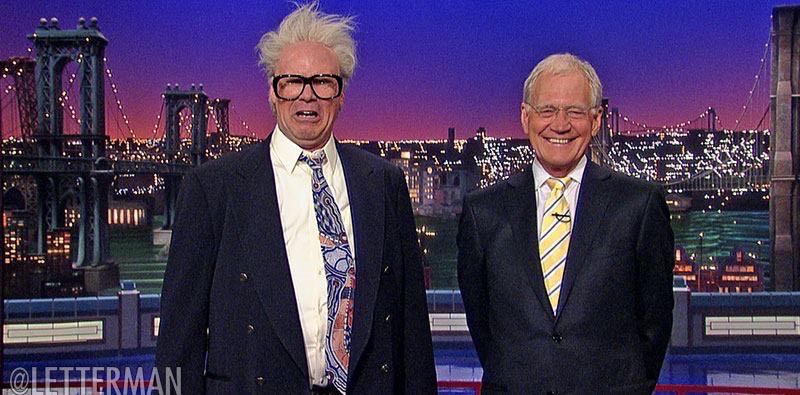
“From the woodwind section of The New York Philharmonic...”
It is Episode 6,016
May 4, 2015
“And now . . . center fielder for your Go Go White Sox . . . David Letterman.” Dave begins this week with a few retirement jokes. He mentions that he just got a call from his mom saying, “I heard you were fired.” He teases tonight’s appearance by President Obama by joking that with Obamacare, employees can lose their longtime jobs and still have health care coverage. To his staff he says, “You’re welcome.”
Someone in the audience starts talking, and the camera pans out to the audience to see Will Ferrell dressed as baseball announcer Harry Caray. This imitation may not be Will Ferrell’s most popular one, but it always tickled Dave when Ferrell was a guest.

Bill Scheft: Will Ferrell interrupting the monologue as Harry Caray? Absolutely note perfect. I can’t think of anyone that plays the camera with more skill or confidence. I got to see him in the airlock after the taping and he said to me, “There’s nothing better than standing next to Dave and seeing him laugh at something you do. And not just laugh, giggle.” I added, “And not just giggle, turn away and giggle, like he doesn’t want to spoil the bit.”
There is no comedy bit for Act 2. Dave welcomes then-sitting President Obama. Paul has rented timpani for the occasion, and “Hail to the Chief” reflects this with the roll of the timpani. Obama ribs Dave for liking Michelle Obama better. Obama says, “I assure you, you are not alone. But I’m not gonna let her have all the fun. Mainly, I came by to say goodbye to Biff and Paul. But they said I couldn’t get on the set unless I also spoke to you.” Dave thanks him for sending The President’s Own with the First Lady. Obama explains, “They are not just playing music. They’re serving in all kinds of ways.” Dave says, “A guy in a huge bearskin hat brings them out and then they have a whole different conductor.” Obama gets the last laugh before the commercial break with, “Yes, they do. You were really paying attention. That’s good.”
Rick Scheckman: When you have the president as a guest, there would be a sweep of the building. Kathy Mavrikakis would be meeting with the Secret Service for over a week before the visit. How are they getting him in? Where are they entering? All that kind of stuff. Secret Service would be in the back of the house in the theater.
Kathy Mavrikakis: Basically having a huge political guest meant dealing with Secret Service. I also supervised the audience. We would have to get to every audience member and let them know to come faster and earlier in the day than they normally would. We would try to get extra music to play for them because they had to sit in their seats earlier because everyone had to be wanded and checked more thoroughly when the Secret Service was involved. The staff had to wear their IDs; they had to come in a different entrance.
Rick Scheckman: I would stay in my office on those days. At about 11:30 the stage was cleared so the bomb-sniffing dogs and Secret Service could come. Then we would have our badges, but you could only enter through the lobby, where there were metal detectors. There were sharpshooters on the roofs across the street.
Jeremy Weiner: We are given a heads-up in an email saying, “There is going to be a lot of extra security today, so if you don’t have to be backstage, steer clear.” You would try to avoid those areas. It was fascinating to see Secret Service hanging out.
Kathy Mavrikakis: Once the Secret Service locked down the side entrance where the president would come in, you couldn’t use it again. For a sitting president it is much more intense than for a former president. The government paid for the Secret Service. It only affected our budget if I had to bring in extra security that day.
Jeremy Weiner: One time Vice President Al Gore was on the show. My job that day was to shepherd Calvert DeForest [Larry “Bud” Melman] through his live walk-on during the monologue. As part of that, I had to take Calvert around to the dressing room. He told me he had to go to the restroom. I took him down to the basement to go the restroom, and I am waiting outside. Al Gore comes down with his Secret Service detail, and a serviceman just opens the bathroom door. Calvert didn’t lock it. I see the Vice President of the United States of America walk into the bathroom, and I heard Calvert DeForest yelp, “Oh my God!” I am sure Al Gore has never been the same.
The second segment takes a more serious tone as they discuss the recent riots in Baltimore. They discuss racism, poverty, slavery, and Jim Crow. To see a difference in how the world has changed since 2015, here is a direct quote from the president of the United States that night. Notice the complete sentences and intricate thoughts expressed, tempered with concern for other human beings.
“This country, our democracy, works because ordinary folks, well-meaning people, each and every day are trying to make it a little better. And we are teaching understanding to our kids, and when mistakes are made we acknowledge them, as opposed to try to cover them up. And most importantly in my mind, we think about not just our own kids, but we think about all kids, when we say to ourselves that that child in Baltimore has tough circumstances but that child is worth, in the eyes of God, just as much as my child. We need to make sure to make an investment in them. When we get to that point, then not only does that child do better, but the country as a whole does better. And that requires the kind of sustained commitment that I’d like to see.”
—President Obama, May 4, 2015 Late Show
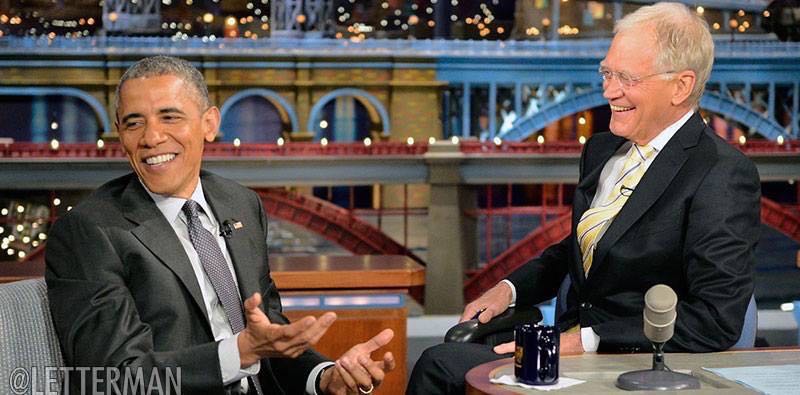
The audience applauds and Dave asks, “Is this the first country you have presidented?” Obama responds, “It is, I suspect, the first and last. Unlike late-night talk-show hosts, I am term limited.”
Jerry Foley: When you talk about Obama and Dave talking about a shooting in Baltimore, it starts with this native intelligence you can’t fake, and the two of them share that. I think they both realized that words count. Once you have drawn people into the intensity of their conversation, you are obligated as host and president to open the door so people can see the exit and go forward and have hope. I am not saying Dave thinks about all that before he starts the show. It just comes naturally. He is a conversationalist, and he is an intelligent guy. He is not one to leave the conversation in darkness and despair. He wants to end it on an up note.
Mike Buczkiewicz: When Baltimore happened and we knew we wanted to discuss it, I think the president’s office was game. They looked at our show as one of the few places that you can have a conversation that wasn’t three minutes of a cable news hit or a Meet the Press-type show. We can have fun and a good conversation. We never put preconditions on an interview, and this went for anybody. My pat line was always, “We don’t put conditions on an interview, for the simple fact that I can go to Dave and say, ‘We can’t talk about X, Y, and Z,’ and he will go out there and the first three questions will be about X, Y, and Z.” President Obama could take a punch, and Dave knew it. Dave could needle him, and Obama would needle him right back.
Jerry Foley: Dave, like any other comedian, will do anything for a laugh. But if you go back to several moments of national crisis, Dave’s humor was comforting. It was defusing and hopeful, that in the middle of an intelligent dissertation about a variety of topics he could find the lighter note that would make you feel better and feel like we have quantified how horrible the situation is, but here is this guy to find the perfect time to punctuate these moments with humor. I found it to be comforting and really kind of bold of him. Who makes a joke in the middle of a Congressional Honor recipient’s recalling a firefight they were in? Dave would find the perfect moment to interject something clever, lighthearted that would take you back to the present and set you up for the future. It is only a very high level of intelligence that can do that. You can’t fake it or script it. There were so many moments like that over the years. You kind of stick a finger in your ear and shake it a little bit and say, “What did he just say?” That is surgical work.
In the next segment they discuss the Free Trade Agreement and then talk about retiring. Obama suggests that they should play dominoes together. When Obama asks Dave what he is going to do in retirement, Dave responds, “I plan to teach law at Columbia.”
Mike Buczkiewicz: At the time, there was a question of what the president would do after he leaves office. I had told Dave that morning that in the paper there was speculation that Obama was going to go back to Columbia law and teach. And Dave was like, “Really?” Then flash forward to the exchange at the end of that interview when Dave asks, “What are you gonna do now?” and Obama says, “What are you gonna do now?” Dave deadpans, “I am gonna teach law at Columbia.” You could see in Obama’s face that he just lost it. Dave had that uncanny ability to retain little pieces of color and then pull them out at the perfect moment.
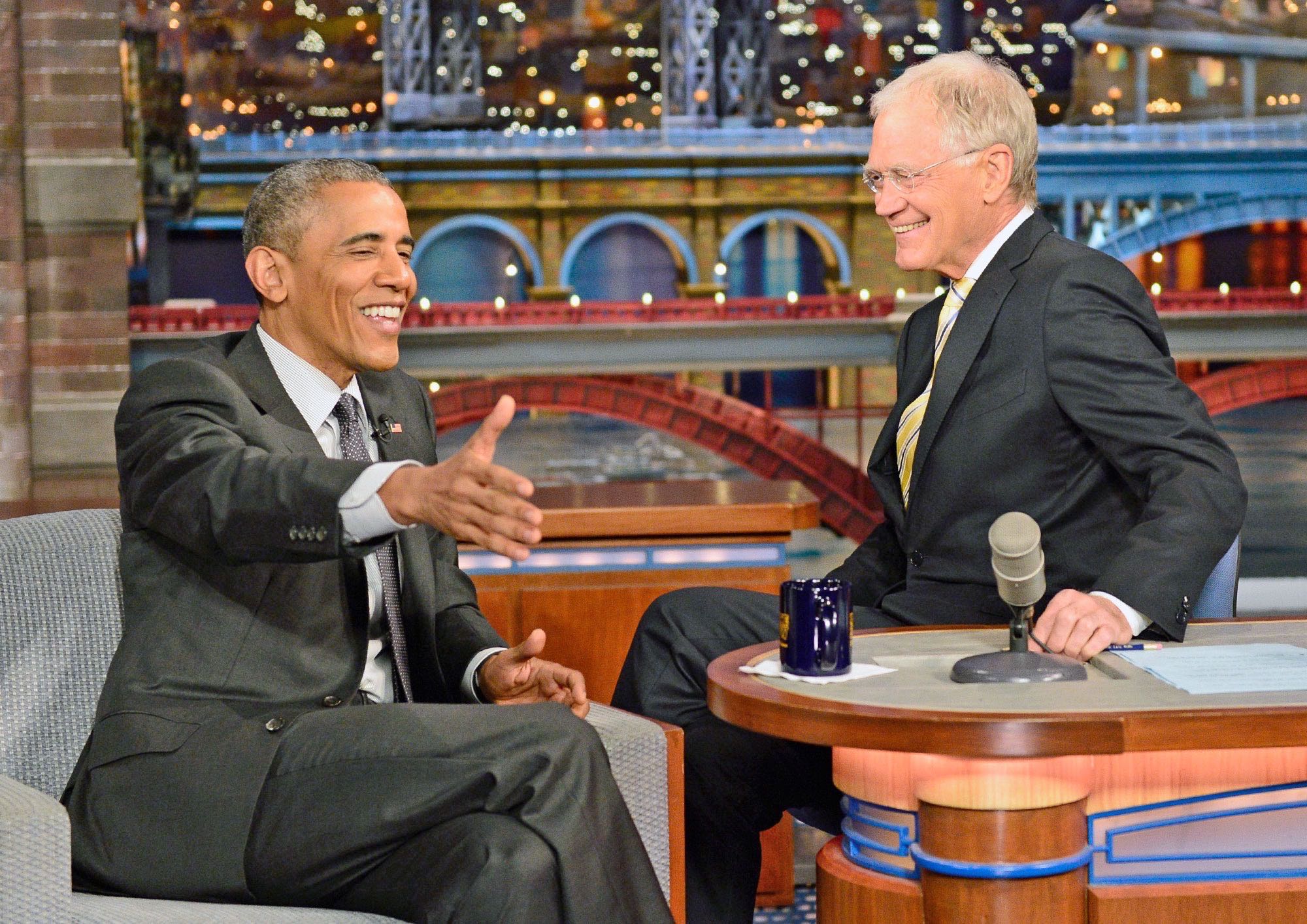
Photo courtesy of @letterman.
As the interview wraps up, the president of the United States thanks David Letterman for what he has given to the country. This is something that Johnny Carson didn’t get during his last days on the air. “We’ve grown up with you. The country has—after a tough day at the office or coming home from work—knowing you’ve been there to give us a little bit of joy and a little bit of laughter. It has meant so much. You’re part of all of us. You’ve given us a great gift and we love you.” Dave tries to change the subject by complimenting Obama. The president says, “I meant what I said. We love you.”
Sheila Rogers: I can’t take credit for booking Obama. That was Mike Buczkiewicz. Mike would just say, “I think Obama is gonna be available.” And I’d say, “Where did you want him?” Mike, who now works at Morning Joe, was our political person. We had great relationships with the Obamas and Bill Clinton from previous appearances. When we got the date of the end of the show, as I was reaching out to the A-list stars, Mike was getting in touch with the Obamas. He really organized all that.
Mike Buczkiewicz: Trying to get a president to come on is no small order. It was cool to call and say, “This is our final show date, we would love to have the president come on before the final show,” and for them to say, “Sure, let’s find a date.”
Bill Scheft: When Dave got the Kennedy Center Honor, I went with him to the White House. Barbara, Jude, and I went. We were on the receiving line. I hear Obama say, “Hey, Letterman, you in my house now. We keep it a little warmer here.” I think Obama was fond of him.
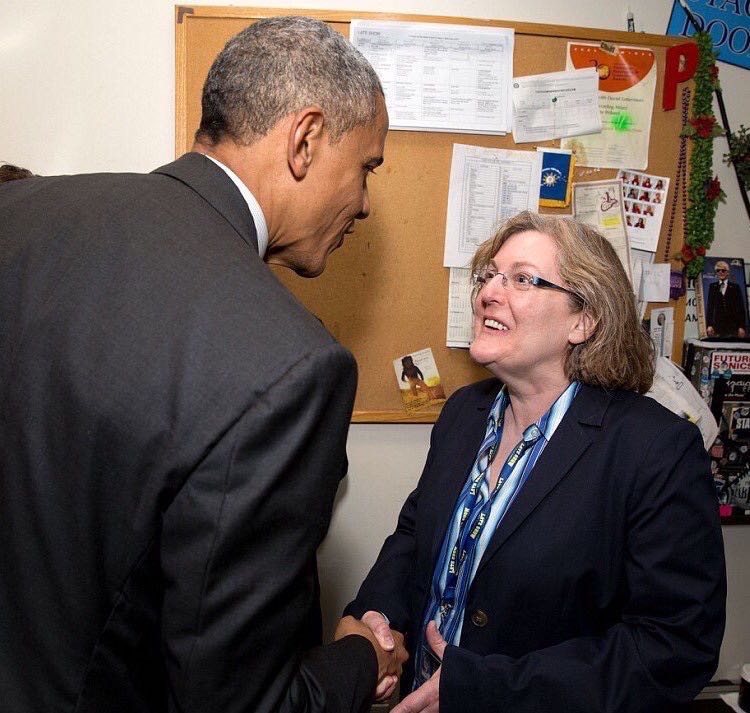
Photo courtesy of Barbara Gaines.
Barbara Gaines: My Obama story is, my mother, may she rest in peace, would always ask, “Who did you meet? Who did you talk to?” She would be very upset because she wanted to tell her friends that I stood next to a lot of famous people. But I never talked to the celebrity, only to Dave. That was my policy. No one told me to do that. So even if the president was on, I only talked to Dave. When I eventually left the podium and went to the control room and the president was on, I wasn’t even on stage. So I clearly wouldn’t see him. This would be the last time I would ever have a chance to be near the president of the United States—my president. I said to Jude, “We have to meet this guy.” She said, “That isn’t gonna happen.” I said, “We have to be on the welcoming committee.” She said, “We can’t. We are up in the dressing room with Dave going over the show. There is no time for us to be on the welcome committee.” I said, “It’s May 4. The show is ending in less than three weeks. So what if we leave the makeup room? We are going.” So I get us on the welcoming committee. The talent department told us what to do, since we had never done anything like that in thirty years. They said, “You have to say, ‘Hello, Mr. President, thank you for coming. This is the green room.’” I said, “We are grown women. We know what to say and how to do this.” The president walks in, and like two ninnies, it was like we saw The Beatles. We screamed, “Oh my God, it’s you.” He said, “Yeah, it’s me.” Just as cool as can be. We hugged him. That was our president of the United States.
Musical Guest
The Avett Brothers and Brandi Carlile are the musical guests. Dave promotes Brandi Carlile’s newest album, The Firewatcher’s Daughter, but the song they perform is not on that album. It is an old country standard, “Keep on the Sunny Side.”
Sheryl Zelikson: I think Brandi might have been booked, and then I found out that Dave wanted to hear “Keep on the Sunny Side.” I would listen to the song, and then I would start to write a list of people that have been on the show that I think can perform the song and make it special. I knew Brandi had an album coming out, and the Avett Brothers are one of my favorite bands that can do everything. And they know Brandi. It was like the stars aligned. They knew that Dave wanted to hear it. I think it was nice to see these artists sing this song, which was a little outside their box, and take the time to learn and make it a very special performance. I loved that. Dave definitely wanted to hear that song.
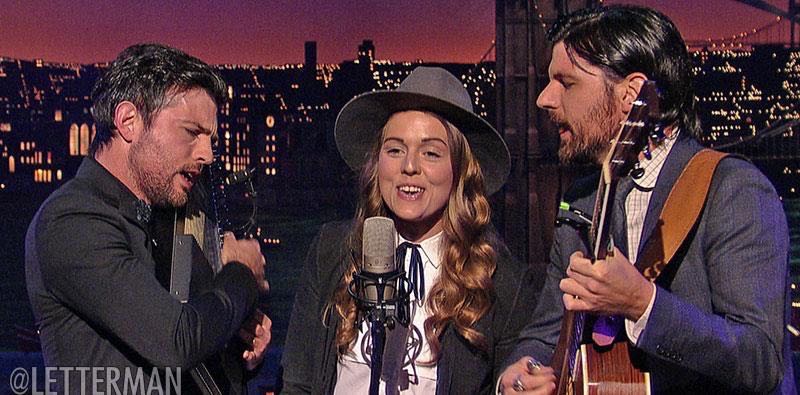
Worldwide Pants Tag: “Do you know where your pants are?”